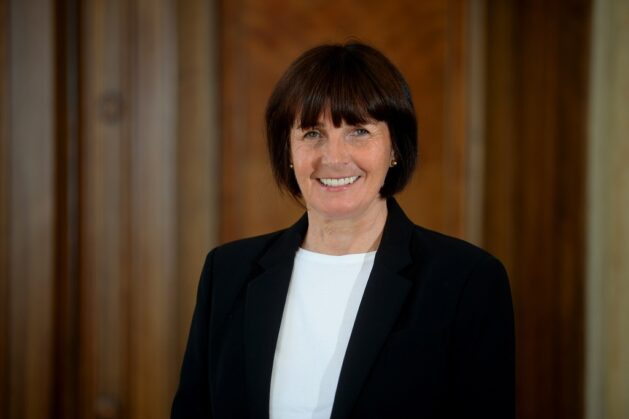What is Lancashire’s secret to levelling up success?
The county was awarded £200m of the £355m handed out in the North West in the latest round of the Levelling Up Fund. County council leader Phillippa Williamson said the impressive return is down to confidence, collaboration, and a pipeline of impactful projects.
Bids totalling £150m for major projects in Blackburn, Blackpool, Hyndburn, Lancaster, and Preston were all successful, while Lancashire County Council was given £50m to green its transport system.
“I was very confident about the bids when they went in,” Williamson told Place North West. “It was a plan. It wasn’t luck.”
As well as being confident about the power of the projects put forward, which included the much-vaunted Eden Morecambe, Williamson said the collective approach taken by Lancashire’s local authorities was a key ingredient in the county’s success.
“All the leaders have worked together collaboratively with our MPs and businesses to decide which projects would make the most impact in addressing some of the issues that we have got.
“It is that collaboration and willingness to work together for the good of the whole of Lancashire that was the difference.”
The biggest win was undoubtedly the £50m the government awarded to Eden Morecambe, which is billed as a game-changing development for the coastal town.
Plans for the scheme were announced in 2018 but the projects’ partners were made to wait until the end of last month for Whitehall to confirm it would contribute a hefty chunk of cash towards the £120m development.
Eden’s “massive impact” is not just a victory for Morecambe, Williamson said, but for the whole of the North West.
Other Lancashire projects to be awarded Levelling Up Fund cash included Blackpool’s Multiversity and the proposed redevelopment of Accrington Market Hall, but It wasn’t all good news for Lancashire.
Bids totalling £50m in Rossendale, Chorley and Fylde did not make the cut.
Despite this, the likes of Greater Manchester and Liverpool City Region – which managed to secure a combined £93m in LUF round two – no doubt looked on enviously at Lancashire’s £200m haul.
The two city regions are home to 4.3m people, whereas Lancashire, which received twice the amount of funding, has 1.4m residents.
In all, Lancashire’s ability to convince the government that its projects were among the worthiest equates to an investment of £130 per person. Much more than the £48 per head national average.
In the aftermath of the announcements, some councils publicly criticised the government’s approach to levelling up.
In their view, pitting areas against each other for a limited pot of cash is not the way to solve regional inequalities.
Liverpool City Mayor Joanne Anderson said that the government needs to move away from its current methodology and provide councils with “resources that empower us to deliver improvements”. She warned that otherwise levelling up “is just an empty, rhetorical slogan.”
Williamson agrees that the process is not perfect but is more forgiving than many of her counterparts.
“It isn’t the answer to everything, but as a catalyst for communities and economic development it is really, really helpful,” she said.
Williamson also has no problem fighting it out for a share of a pretty small pie.
“I am not afraid to enter into a competition on behalf of Lancashire because I think we have got a really good offer.
“It is all about confidence and people feeling that this is a place they can invest in.”
Cynics may argue that Lancashire was successful in the Levelling Up Fund bidding war because the county council’s politics align with those of Whitehall. Williamson is quick to rebuff any indications of Conservative favouritism.
“I don’t think that is part of it. I think what it was is that we made a really good case,” she said.
“From the government’s perspective, why wouldn’t you want to put your money into the best projects with the biggest impact? We could show that and so we benefitted from it.”
Lancashire’s relatively meagre return in the first round of LUF awards – £26m of an asked-for £76m – appears to discredit the Tory bias hypothesis further. The Labour strongholds of Liverpool City Region and Greater Manchester won a combined £189m in the first round.
After hitting the jackpot with big wins across the county in round two, does Williamson have any words of wisdom for other areas that were not so lucky in the levelling up lottery?
“You need to understand your locality. We had loads of data and evidence and input from the community on where we thought we could make the most impact,” she said
Williamson also says the county council “oiled the wheels” of some of its bids by setting up its own version of the LUF, which makes distributions to each district to support bids.
After toasting the successful bids, the next challenge comes when thinking about spending the money.
Winning funding is only half of the battle. The government’s imposition of strict deadlines on when grants must be spent means it is very much a case of use it or lose it.
This is likely to cause more than a few headaches when it comes to delivering the biggest and arguably most important project in Morecambe’s history.
“We have to have Eden up and running in the next two years,” Williamson said. “It is a challenge but we think we can do it.”
Learn more about the development scene in Lancashire. Book your Lancashire Development Update ticket.







As usual Chorley was unsuccessful, I think a large part due to having the Speaker Lindsay Hoyle as MP who stands unopposed at the election, so there are no votes to be gained in giving funding to the Borough.
By Dom
The idea that pork barrel politics played no role in these decisions is a bit naive at best. Favoured MPs lobbying undoubtedly played a role. It’s noted that some Round 1 projects are struggling with cost inflation. Some of these new initiatives will also struggle with the unforeseen cost increases and will undoubtedly have to be changed. Difficult to see how the public partners could plug any gap. Also county council would have had nothing to do with Blackpool’s “multiversity” nor Blackburn’s success as these are unitary authorities.
By Sceptic
@Sceptic. The Multiversity bit was a joint one between Blackpool and Wyre councils, the latter a district under LCC.
By SW
Tory marginal seats -Hyndburn, Pendle, Burnley, Darwen, 2 Blackpool seats, Morecambe and Lunesdale
By snowman
Maybe it’s the quality of the officers who put the bid together
By Thoughts
Most of the funding gone to Tory marginals …..Blackburn a unitary council as is Blackpool nothing to do with the county council
By George
Multiversity sounds like a buzz word project, they should really call it AI-versity.
By Anonymous
Bolton gets nothing and is a Tory marginal and only Tory council in Greater Manchester
By Anonymous
@sceptic To be fair some of the tory mps and client journalists are actively promoting the fact that these marginal seats are getting more funding. They aren’t pretending this isn’t a tactic lol
By Levelling Up Manager